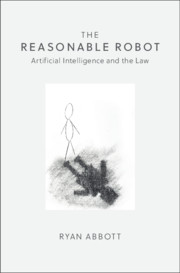Book contents
- The Reasonable Robot
- The Reasonable Robot
- Copyright page
- Dedication
- Contents
- Introduction: Artificial Intelligence and the Law
- 1 Understanding Artificial Intelligence
- 2 Should Artificial Intelligence Pay Taxes?
- 3 Reasonable Robots
- 4 Artificial Inventors
- 5 Everything Is Obvious
- 6 Punishing Artificial Intelligence
- 7 Alternative Perspectives on AI Legal Neutrality
- Third-Party Materials
- Notes
- Index
6 - Punishing Artificial Intelligence
Published online by Cambridge University Press: 15 June 2020
- The Reasonable Robot
- The Reasonable Robot
- Copyright page
- Dedication
- Contents
- Introduction: Artificial Intelligence and the Law
- 1 Understanding Artificial Intelligence
- 2 Should Artificial Intelligence Pay Taxes?
- 3 Reasonable Robots
- 4 Artificial Inventors
- 5 Everything Is Obvious
- 6 Punishing Artificial Intelligence
- 7 Alternative Perspectives on AI Legal Neutrality
- Third-Party Materials
- Notes
- Index
Summary
Criminal law falls short in cases where an AI functionally commits a crime and there are no individuals who are criminally liable. This chapter explores potential solutions to this problem, with a focus on holding AI directly criminally liable where it is acting autonomously and irreducibly. Conventional wisdom holds that punishing AI is incongruous with basic criminal law principles such as the capacity for culpability and the requirement for a voluntary act. Drawing on analogies to corporate and strict criminal liability, the chapter shows AI punishment cannot be categorically ruled out with quick theoretical arguments. AI punishment could result in general deterrence and expressive benefits, and it need not run afoul of negative limitations such as punishing in excess of culpability. Ultimately, however, punishing AI is not justified, because it might entail significant costs and would certainly require radical legal changes. Modest changes to existing criminal laws that target persons, together with potentially expanded civil liability, is a better solution to AI crime.
Keywords
- Type
- Chapter
- Information
- The Reasonable RobotArtificial Intelligence and the Law, pp. 111 - 133Publisher: Cambridge University PressPrint publication year: 2020

